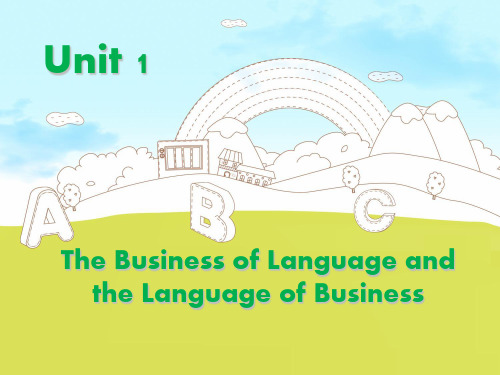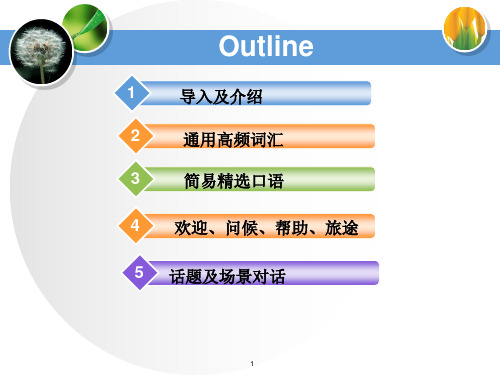商务英语.ppt
合集下载
商务英语(3).ppt

It could be true. It could arrive today.
You might be right. He might ask for an extra week.
That can’t be right. It can’t add up.
Pronunciation II: Stress patterns
Present passive We use a passive sentence 1. When we are interested in who or what
acts. 2. When it is obvious who or what does the
action so it is unnecessary to say. Form:
Adverbs: maybe, perhaps, probably
Note: maybe is one word when it means perhaps. Compare the two sentences: Maybe demand is very high in Chicago. Demand in Chicago may be very high.
Language focus
Modal verbs: talking about possibility Present passive Pronunciation: word linking
stress patterns
Lead-in 1. In which country is the shopping basket of
商务英语 Unit 9 Busi语(上)
Unit 9 Business Environment
商务英语综合教程unit1ppt课件

Romance: e.g. French, Italian, Spanish, Portuguese Germanic: e.g. German, Swedish Norse: language spoken by Scandinavian inhabitants Celtic: mainly spoken in Wales, Scotland, Ireland, Cornwall and the Isle of Man
精选ppt
2
Research and discussion
• Julius Caesar • Duke of Normandy • Old English • Latin • French • Middle English • A Table Alphabeticall • Samuel Johnson • Webster • Oxford
2. Reveal the true, objectionable nature of (someone or something)
e.g. He has been exposed as a liar and a traitor.
精选ppt
17
3. If someone is exposed to something dangerous or unpleasant, they are put in a situation in which it might affect them. e.g. Most people in the world are non-smokers and have a right not to be exposed to other people's smoround
Detailed Reading
精选ppt
2
Research and discussion
• Julius Caesar • Duke of Normandy • Old English • Latin • French • Middle English • A Table Alphabeticall • Samuel Johnson • Webster • Oxford
2. Reveal the true, objectionable nature of (someone or something)
e.g. He has been exposed as a liar and a traitor.
精选ppt
17
3. If someone is exposed to something dangerous or unpleasant, they are put in a situation in which it might affect them. e.g. Most people in the world are non-smokers and have a right not to be exposed to other people's smoround
Detailed Reading
高级商务英语1.ppt

rid itself of tired, outdated perspectives and uncover the revolutionary ideas that
are lying deep in an organization.
5. It criticizes the control of policy-making by key personnel.
revolutionary companies or they can revolutionize the way their companies create strategy. In Revolution and Strategy, Gary Heath argues that any approach that
does not challenge the status quo is not a strategy at all. In too many companies,
the strategy-planning process is monopolized by senior managers, and what
5. It criticizes the control of policy-making by key personnel.
Part 1 考试策略
A
和control同义
Those serving in industry today have two options: they can surrender the future to
passes for strategy is sterile and uninspiring. To create truly revolutionary strategies, a strategy-making process must be demanding and inclusive; it must
剑桥商务英语教程ppt课件精选全文

She smiled in greeting. 她微笑着打招呼。 She welcomed us with a cheerful
greeting. 她兴高采烈地打招呼欢迎我们。
16
ppt课件
TWO KINDS OF GREETINGS
1)Formal/Informal 2)Greeting by words/Greeting
Good morning
before 12am
Good afternoon between 12am to 5pm
Good evening
after 5pm
Good night when leaving at night or going to bed
29
ppt课件
UNSPOKEN GREETINGS
ppt课件
Unit 1
Greetings and Introductions
1
ppt课件
LEARNING OBJECTIVES :
How to make introductions? 1)How to introduce yourself? 2)How to introduce others? How to greet people when you
Between friends you can add dude(/dju:d/小伙 子)/man, etc. to the end
19
ppt课件
How are you? -- Pretty good. -- Fine, thank you. -- Nothing much. / Nothing special.
40
ppt课件
Miss. 小姐,用作未婚女子姓名之前 Mrs. 夫人, 太太 Ms. 女士, 用在婚姻状况不明的女子姓
greeting. 她兴高采烈地打招呼欢迎我们。
16
ppt课件
TWO KINDS OF GREETINGS
1)Formal/Informal 2)Greeting by words/Greeting
Good morning
before 12am
Good afternoon between 12am to 5pm
Good evening
after 5pm
Good night when leaving at night or going to bed
29
ppt课件
UNSPOKEN GREETINGS
ppt课件
Unit 1
Greetings and Introductions
1
ppt课件
LEARNING OBJECTIVES :
How to make introductions? 1)How to introduce yourself? 2)How to introduce others? How to greet people when you
Between friends you can add dude(/dju:d/小伙 子)/man, etc. to the end
19
ppt课件
How are you? -- Pretty good. -- Fine, thank you. -- Nothing much. / Nothing special.
40
ppt课件
Miss. 小姐,用作未婚女子姓名之前 Mrs. 夫人, 太太 Ms. 女士, 用在婚姻状况不明的女子姓
商务英语口语ppt课件

17
高频通用词汇
❖ Director 厂长、主任、所长、部长 ❖ Division manager 科长 ❖ Chief engineer 总工程师、轮机长[,endʒi'niə] ❖ Engineer 工程师 ❖ Technician 技术员[tek'niʃən] ❖ Head of group 组长 ❖ Foreman 工长、领班['fɔ:mən] ❖ Inspector 检验员[in'spektə] ❖ 领读5遍,选一列学员依次读。要求学员课下背下单词。
❖ The girl was moved, but somebody told her “don’t forget HIJK!” “He is just kidding.”
❖ The girl responded: It doesn’t matter whether he lied to me. There is “LMNOP”. Love must need our patience.
25
Greetings
❖遇到熟人
▪ Haven’t seen you for ages/some time. 太久不见了。 ▪ How have you been(doing)? 最近怎么样? ▪ Hey, man. How’s it going? ▪ How are you getting on/making out?
❖ Would you mind me opening the window? 你介意我开窗 户吗?
❖
标识英语
11
Dialogue1 初次见面
场景一:Edward船东来涂装厂房看船体喷涂进度。
❖ A:Are you Edward Green? 你是Edward Green 先生么? ❖ B: Yes,I am. 是的。 ❖ A: How do you do? I’m Yuanfei Chen, foreman of painting center.
高频通用词汇
❖ Director 厂长、主任、所长、部长 ❖ Division manager 科长 ❖ Chief engineer 总工程师、轮机长[,endʒi'niə] ❖ Engineer 工程师 ❖ Technician 技术员[tek'niʃən] ❖ Head of group 组长 ❖ Foreman 工长、领班['fɔ:mən] ❖ Inspector 检验员[in'spektə] ❖ 领读5遍,选一列学员依次读。要求学员课下背下单词。
❖ The girl was moved, but somebody told her “don’t forget HIJK!” “He is just kidding.”
❖ The girl responded: It doesn’t matter whether he lied to me. There is “LMNOP”. Love must need our patience.
25
Greetings
❖遇到熟人
▪ Haven’t seen you for ages/some time. 太久不见了。 ▪ How have you been(doing)? 最近怎么样? ▪ Hey, man. How’s it going? ▪ How are you getting on/making out?
❖ Would you mind me opening the window? 你介意我开窗 户吗?
❖
标识英语
11
Dialogue1 初次见面
场景一:Edward船东来涂装厂房看船体喷涂进度。
❖ A:Are you Edward Green? 你是Edward Green 先生么? ❖ B: Yes,I am. 是的。 ❖ A: How do you do? I’m Yuanfei Chen, foreman of painting center.
商务英语谈判课件(PPT 35页)

Business Negotiation English
Objectives
1. Introduce the students to the main principles of business negotiation.
2. The students get familiar with the types of negotiation.
*Separate the people from the problem.
Techniques: ---Establish an accurate perception. ---Cultivate appropriate emotions. ---Strive better communication.
Disadvantages :
Pressure an individual to compromise and accommodate in ways not in his interest.
Avoid confrontational strategies, which can be helpful at times.
11.Getting a child to go to bed.
12.Picking a successor for the CEO of a company where you are on the board.
3. Types of negotiation:
1. Competitive style 2. Accommodative style 3. Avoidance style 4. Compromising style 5. Collaborative style 6. Vengeful style 7. Self-inflicting style 8. Vengeful and self-inflicting style
Objectives
1. Introduce the students to the main principles of business negotiation.
2. The students get familiar with the types of negotiation.
*Separate the people from the problem.
Techniques: ---Establish an accurate perception. ---Cultivate appropriate emotions. ---Strive better communication.
Disadvantages :
Pressure an individual to compromise and accommodate in ways not in his interest.
Avoid confrontational strategies, which can be helpful at times.
11.Getting a child to go to bed.
12.Picking a successor for the CEO of a company where you are on the board.
3. Types of negotiation:
1. Competitive style 2. Accommodative style 3. Avoidance style 4. Compromising style 5. Collaborative style 6. Vengeful style 7. Self-inflicting style 8. Vengeful and self-inflicting style
商务英语谈判课件.ppt

sequences • Use the power of competition to leverage power • Constrain yourself. • Good information is always a source of power. • Do what you can to manage the process
Why is power important to negotiators?
• The negotiator believes he or she currently has less power than the other party. • The negotiator believes he or she needs more power than the other party to increase the probability of securing a deof power ?
• Informational sources of power • Personal sources of power • Power based on position in an organization • Relationship-based sources of power • Contextual sources of power
❖ The definition of negotiation ❖ The negotiation opportunity ❖ The selection of negotiators ❖ Protocol ❖ Communication ❖ Time sensitivity ❖ Risk propensity ❖ Groups versus individuals ❖ The nature of agreements ❖ Emotionalism
Why is power important to negotiators?
• The negotiator believes he or she currently has less power than the other party. • The negotiator believes he or she needs more power than the other party to increase the probability of securing a deof power ?
• Informational sources of power • Personal sources of power • Power based on position in an organization • Relationship-based sources of power • Contextual sources of power
❖ The definition of negotiation ❖ The negotiation opportunity ❖ The selection of negotiators ❖ Protocol ❖ Communication ❖ Time sensitivity ❖ Risk propensity ❖ Groups versus individuals ❖ The nature of agreements ❖ Emotionalism
《商务英语报告》课件

商务英语演讲技巧及注意事项
分享提高商务英语演讲效果的技巧和注意事项。
6. 商务英语沟通技巧
商务英语沟通概述
解释商务英语沟通的重要性和影 响因素,如文化差异和语言障碍。
商务英语沟通中的问题及 解决方案
识别商务英语沟通中可能遇到的 问题,并提供解决方案和应对策 略。
商务英语沟通技巧及注意 事项
分享提高商务英语沟通能力的技 巧和注意事项,如积极倾听和有 效反馈。
《商务英语报告》PPT课 件
本次课件旨在介绍商务英语报告的重要性与技巧,内容全面且易懂,有助于 提高商务英语写作、口语表达和沟通能力。
1. 简介
公司概况
介绍公司的背景信息,包括业务范围、规模和发展历程。
报告目的
明确商务英语报告的目标和意义,解释为什么需要进行商务英语写作。
报告内容
概述商务英语报告的主要内容,包括基础知识、写作技巧、口语表达、演讲技巧和沟通技巧。
2. 商务英语基础知识
商务英语概述
介绍商务英语的定义、范围和应 用领域,以及其对跨国企业的重 要性。
商务英语的重要性
商务英语基础词汇
强调掌握商务英语对于有效沟通、 职场交流和跨文化合作的重要性。
列举一些常用的商务英语词汇, 以帮助读者扩展商务英语词汇量。
3. 商务英语写作技巧
商务英语写作概述
解释商务英语写作的定义和 特点,指导读者如何进行有 效的商务英语写作。
商务英语写作的基本格 式
介绍商务英语写作的常见格 式,包括邮件、报告、简历 和商务计划书。
商务英语写作技巧及注 意事项
分享一些实用的商务英语写 作技巧,帮助读者提高写作 效果和表达准确性。
4. 商务英语口语表达技巧
商务英语口语表达概述
分享提高商务英语演讲效果的技巧和注意事项。
6. 商务英语沟通技巧
商务英语沟通概述
解释商务英语沟通的重要性和影 响因素,如文化差异和语言障碍。
商务英语沟通中的问题及 解决方案
识别商务英语沟通中可能遇到的 问题,并提供解决方案和应对策 略。
商务英语沟通技巧及注意 事项
分享提高商务英语沟通能力的技 巧和注意事项,如积极倾听和有 效反馈。
《商务英语报告》PPT课 件
本次课件旨在介绍商务英语报告的重要性与技巧,内容全面且易懂,有助于 提高商务英语写作、口语表达和沟通能力。
1. 简介
公司概况
介绍公司的背景信息,包括业务范围、规模和发展历程。
报告目的
明确商务英语报告的目标和意义,解释为什么需要进行商务英语写作。
报告内容
概述商务英语报告的主要内容,包括基础知识、写作技巧、口语表达、演讲技巧和沟通技巧。
2. 商务英语基础知识
商务英语概述
介绍商务英语的定义、范围和应 用领域,以及其对跨国企业的重 要性。
商务英语的重要性
商务英语基础词汇
强调掌握商务英语对于有效沟通、 职场交流和跨文化合作的重要性。
列举一些常用的商务英语词汇, 以帮助读者扩展商务英语词汇量。
3. 商务英语写作技巧
商务英语写作概述
解释商务英语写作的定义和 特点,指导读者如何进行有 效的商务英语写作。
商务英语写作的基本格 式
介绍商务英语写作的常见格 式,包括邮件、报告、简历 和商务计划书。
商务英语写作技巧及注 意事项
分享一些实用的商务英语写 作技巧,帮助读者提高写作 效果和表达准确性。
4. 商务英语口语表达技巧
商务英语口语表达概述
- 1、下载文档前请自行甄别文档内容的完整性,平台不提供额外的编辑、内容补充、找答案等附加服务。
- 2、"仅部分预览"的文档,不可在线预览部分如存在完整性等问题,可反馈申请退款(可完整预览的文档不适用该条件!)。
- 3、如文档侵犯您的权益,请联系客服反馈,我们会尽快为您处理(人工客服工作时间:9:00-18:30)。
The procedures
1. what is the situation now? what is the states of the economy and other environments? What opportunities exist for meeting people’s needs? What products and customers are most profitable? Why do people buy ( or not buy) our products? Who are our major competitors? What threats are they to our business?
ORGANIZING
2. where do we want to go? How much growth do we want? What is our profit goal? What are
3. How can we get there from here? This is the most important part of planning. It takes three forms: a. strategic (long-range) planning determines the major goals of the organization and using resources to achieve those goals. b. tactical (short-range) planning is the process of developing detailed, short-term strategies about what is to be done, who is to do it, and how it is to be done. operational planning is the process of setting work standards and schedules necessary to implement the tactical objectives. c. contingency planning is the process of
Defining Management
Management refers to the process of coordinating work activities so that they are completed fficiently and effectively with and through other people.
Assuming that you will probably be a manager and/or work for a manager, you can gain a great deal of insight into the way your boss behaves and the internal workings of organizations by studying management.
Why Study Management?
We all have a vested interest in improving the way organizations are managed. Because we interact with organizations every single day of our lives.
Once you graduate from college and begin your career, you will either manage or be managed. For those who plan on management careers, an understanding of the management process forms the foundation on which to build your management skills.
MANAGEMENT
The application of panning, organization, directing and controlling functions in the most efficient manner possible to accomplish meaningful organizational objectives.
Management Functions
The process of management represents the functions or primary activities engaged in by managers.
Planning function Organizing function Directing function Controlling function
Management
Learning Objectives
Define management Describe management functions Explain organizational structure Distinguish management levels Identify management roles list management skills
Planning
Plans are nothing, planning is everything.
PLANNING
defining goals for future organizational performance and deciding on the tasks and use of resources needed to attain them.
1. what is the situation now? what is the states of the economy and other environments? What opportunities exist for meeting people’s needs? What products and customers are most profitable? Why do people buy ( or not buy) our products? Who are our major competitors? What threats are they to our business?
ORGANIZING
2. where do we want to go? How much growth do we want? What is our profit goal? What are
3. How can we get there from here? This is the most important part of planning. It takes three forms: a. strategic (long-range) planning determines the major goals of the organization and using resources to achieve those goals. b. tactical (short-range) planning is the process of developing detailed, short-term strategies about what is to be done, who is to do it, and how it is to be done. operational planning is the process of setting work standards and schedules necessary to implement the tactical objectives. c. contingency planning is the process of
Defining Management
Management refers to the process of coordinating work activities so that they are completed fficiently and effectively with and through other people.
Assuming that you will probably be a manager and/or work for a manager, you can gain a great deal of insight into the way your boss behaves and the internal workings of organizations by studying management.
Why Study Management?
We all have a vested interest in improving the way organizations are managed. Because we interact with organizations every single day of our lives.
Once you graduate from college and begin your career, you will either manage or be managed. For those who plan on management careers, an understanding of the management process forms the foundation on which to build your management skills.
MANAGEMENT
The application of panning, organization, directing and controlling functions in the most efficient manner possible to accomplish meaningful organizational objectives.
Management Functions
The process of management represents the functions or primary activities engaged in by managers.
Planning function Organizing function Directing function Controlling function
Management
Learning Objectives
Define management Describe management functions Explain organizational structure Distinguish management levels Identify management roles list management skills
Planning
Plans are nothing, planning is everything.
PLANNING
defining goals for future organizational performance and deciding on the tasks and use of resources needed to attain them.
